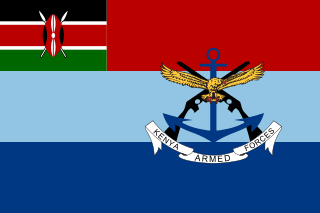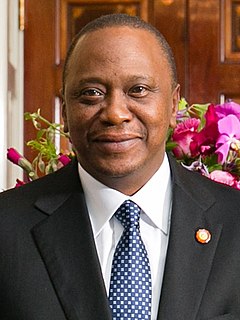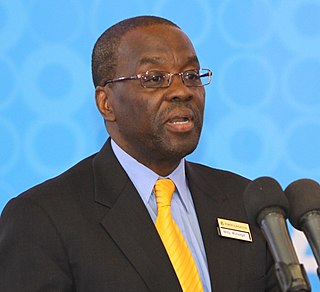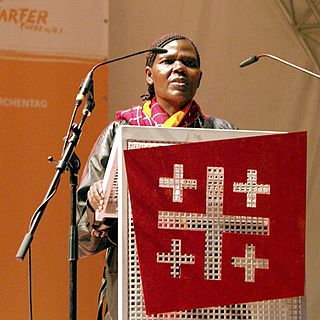Related Research Articles

The Kenya Defence Forces (KDF) are the armed forces of the Republic of Kenya. They are made up of the Kenya Army, Kenya Navy, and Kenya Air Force. The current KDF was established, and its composition stipulated, in Article 241 of the 2010 Constitution of Kenya; it is governed by the KDF Act of 2012. Its main mission is the defence and protection of the sovereignty and territorial integrity of Kenya, recruitment to the KDF is done on yearly basis. The President of Kenya is the commander-in-chief of the KDF, and the Chief of Defence Forces is the highest-ranking military officer, and the principal military adviser to the President of Kenya.

The World Council of Churches (WCC) is a worldwide Christian inter-church organization founded in 1948 to work for the cause of ecumenism. Its full members today include the Assyrian Church of the East, the Oriental Orthodox Churches, most jurisdictions of the Eastern Orthodox Church, the Old Catholic Church, the Lutheran Churches, the Anglican Communion, the Mennonite Churches, the Methodist Churches, the Moravian Church, Mar Thoma Syrian Church and the Reformed Churches, as well as the Baptist World Alliance and Pentecostal Churches. Notably, the Catholic Church is not a full member, although it sends delegates to meetings who have observer status. The WCC arose out of the ecumenical movement and has as its basis the following statement:
The World Council of Churches is a fellowship of churches which confess the Lord Jesus Christ as God and Savior according to the scriptures, and therefore seek to fulfill together their common calling to the glory of the one God: Father, Son and Holy Spirit.
It is a community of churches on the way to visible unity in one faith and one eucharistic fellowship, expressed in worship and in common life in Christ. It seeks to advance towards this unity, as Jesus prayed for his followers, "so that the world may believe".

Daniel Toroitich arap Moi was a Kenyan politician who served as the second president of Kenya from 1978 to 2002. He was the country's longest-serving president. Moi previously served as the third vice president of Kenya from 1967 to 1978 under President Jomo Kenyatta, becoming president following the latter's death.

Emilio Stanley Mwai KibakiCGH was a Kenyan politician who served as the third President of Kenya from December 2002 until April 2013 and is regarded as one of Kenya's founding fathers.

Uhuru Muigai Kenyatta is a Kenyan politician who served as the 4th president of Kenya from 2013 to 2022.
The Goldenberg scandal was a political scandal where the Kenyan government was found to have subsidised exports of gold far beyond standard arrangements during the 1990s, by paying the company Goldenberg International 35% more than their foreign currency earnings. Although it notionally appears that the scheme was intended to earn hard currency for the country, it is estimated to have cost Kenya the equivalent of more than 10% of the country's annual gross domestic product, and it is possible that no or minimal amounts of gold were actually exported. The scandal appears to have involved political corruption at the highest levels of the government of Daniel Arap Moi. Officials in the former government of Mwai Kibaki have also been implicated.
The Anglican–Roman Catholic International Commission (ARCIC) is an organization created in 1969 which seeks to make ecumenical progress between the Roman Catholic Church and the Anglican Communion. The sponsors are the Anglican Consultative Council and the Pontifical Council for Promoting Christian Unity.

William Kipchirchir Samoei Arap Ruto is a Kenyan politician who is serving as the fifth and current president of Kenya since 13 September 2022. Prior to becoming president, he served as the 11th deputy president of Kenya from 2013 to 2022. He previously served in several cabinet positions such as the Minister for Home Affairs, the Minister of Agriculture and as Minister for Higher Education.

Raila Amolo Odinga is a Kenyan politician, former Member of Parliament (MP) for Langata and businessman who served as the Prime Minister of Kenya from 2008 to 2013. He is assumed to be the Leader of Opposition in Kenya since 2013.

Corruption in the government of Kenya has a history which spans the era of the founding president Jomo Kenyatta, to Daniel arap Moi's KANU, Mwai Kibaki's PNU government and the current Uhuru Kenyatta's Jubilee Party government. In the Corruption Perceptions Index 2021 Kenya is ranked 128th out of 180 countries for corruption, tied with seven other countries, including Bolivia, Azerbaijan, Laos, and Paraguay.

John Anthony Kaiser was a Roman Catholic priest and Mill Hill father from Perham, Minnesota, US, who was assassinated near his mission at Morendat, in western Kenya.

The Anglican Church of Kenya (ACK) is a province of the Anglican Communion, and it is composed by 41 dioceses. The current Primate and Archbishop of Kenya is Jackson Ole Sapit. The Anglican Church of Kenya claims 5 million total members. According to a study published in the Journal of Anglican Studies and by Cambridge University Press, the ACK claims 5 million adherents, with no official definition of membership, with nearly 2 million officially affiliated members, and 310,000 active baptised members. The church became part of the Province of East Africa in 1960, but Kenya and Tanzania were divided into separate provinces in 1970.
Gideon Kipsielei Towett Moi is a Kenyan politician and former senator in the Senate of Kenya, representing Baringo County, from 2013 to 2022. He was elected with a landslide win of over 80%, trouncing his opponent Jackson Kosgei. He is also the party leader of the Kenya African National Union (KANU), which for decades was the ruling party in Kenya. He is the youngest son of Kenya's second president, Daniel arap Moi, and Lena Moi. His siblings include; Phillip Moi, Jonathan Moi, John Mark Moi, Raymond Moi, Jennifer Jemutai Kositany, Doris Moi, June Moi.
The South African Council of Churches (SACC) is an interdenominational forum in South Africa. It was a prominent anti-apartheid organisation during the years of apartheid in South Africa. Its leaders have included Desmond Tutu, Beyers Naudé and Frank Chikane. It is a member of the Fellowship of Christian Councils in Southern Africa.

The predominant religion in Kenya is Christianity, which is adhered to by an estimated 85.52% of the total population. Islam is the second largest religion in Kenya, practised by 10.91 percent of Kenyans. Other faiths practised in Kenya are Baháʼí, Buddhism, Hinduism and traditional religions.

The Presbyterian Church of Brazil is an Evangelical Protestant Christian denomination in Brazil. Oldest of the Reformed family of Protestantism in Brazil. It is the largest Presbyterian denomination in the country, having an estimate 702,949 members, 4,915 ordained ministers and 5,420 churches and parishes. It is also the only Presbyterian denomination in Brazil present in all 26 States and the Federal District. It was founded by the American missionary Rev. Ashbel Green Simonton, who also oversaw the formal organization of the first congregation and the first Presbytery. Although the Presbyterian Church of Rio de Janeiro was only formally organized in January 1863, and the Brazilian church only left the jurisdiction of the joint missions board of the American churches in 1888, when the Synod was formed, the denomination considers the date of Simonton's arrival in Brazil, August 12, 1859, as its foundation date.

Willy Munyoki Mutunga is a Kenyan lawyer, intellectual, reform activist, and was the Commonwealth Special Envoy to the Maldives. He is also an active member of the Justice Leadership Group. He is the retired Chief Justice of Kenya and President of the Supreme Court of Kenya.
The Commission of Inquiry into the Education System of Kenya commonly referred to as the Davy Koech Commission was a Kenya Government Commission established on 15 May 1998 by the then President Daniel arap Moi. The commission was led by Dr. Davy Kiprotich Koech and was to investigated the question of the appropriateness of Kenya’s 8-4-4 education system

Agnes Regina Murei Abuom is a Kenyan Christian organizational worker who serves as moderator of the Central Committee of the World Council of Churches (WCC) since 2013. She is the first woman and the first African to hold this post. She represents the Anglican Church of Kenya.
References
- ↑ "A study of Commissions of Inquiries in Kenya" (PDF). Africog.org. Retrieved 30 September 2017.
- ↑ "AllAfrica.com: The many controversies of the satan-hunters". Archived from the original on 2002-06-16. Retrieved 2017-09-30.
- ↑ "Africanews - 41- August 1999". Web.peacelink.it. Retrieved 30 September 2017.
- ↑ "Devil worship rampant in schools". Nation.co.ke. Retrieved 30 September 2017.
- ↑ Kenya National Assembly Official Record (Hansard). Republic of Kenya. 1999. pp. 1893–94. Retrieved 30 December 2012.
- ↑ "BBC News - Africa - Devil worship 'widespread' in Kenya". News.bbc.co.uk. Retrieved 30 September 2017.
- ↑ "Archived copy" (PDF). Archived from the original (PDF) on 2017-09-30. Retrieved 2012-12-30.
{{cite web}}: CS1 maint: archived copy as title (link)